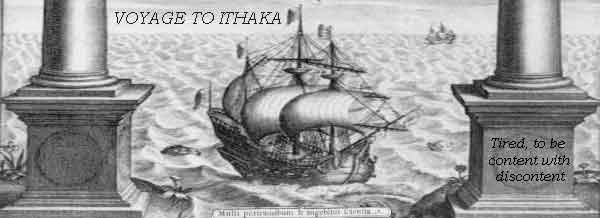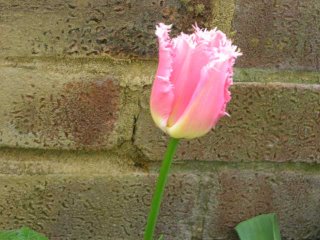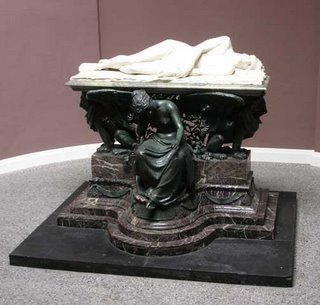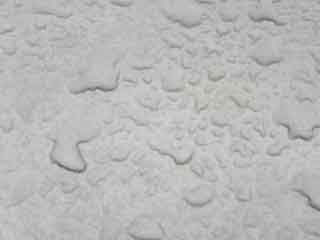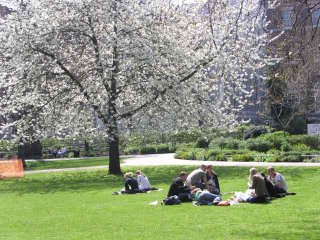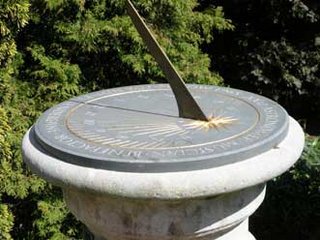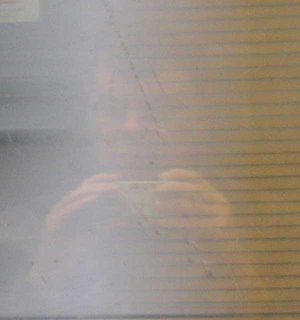Saturday, April 29, 2006
Friday, April 28, 2006
More Baker
Quand viendra la saison nouvelle,
Quand auront disparu les froids,
Tous les deux nous irons, ma belle,
Pour cueillir le muguet aux bois...
And, just now,
I saw pale kings, and princes too,
Pale warriors, death-pale were they all.
They cried - "La belle dame sans merci
Hath thee in thrall!"
And typing this reminds me that I once set a line from this poem as a topic for my students - "And no birds sing". And one submission was the silliest, most maddening little Flash game that I have ever seen, requiring you to smash with virtual mallets annoying little chirping birds, which I still remember after all these years. Thanks, Nattaya.
Listening to Janet Baker
Fain would I wed a fair young man that day and night could please me,
When my mind or body grieved that had the power to ease me.
Maids are full of longing thoughts that breed a bloodless sickness,
And that, oft I hear men say, is only cured by quickness.
Oft I have been woo'd and prayed, but never could be moved ;
Many for a day or so I have most dearly loved,
But this foolish mind of mine straight loathes the thing resolved ;
If to love be sin in me that sin is soon absolved.
Sure I think I shall at last fly to some holy Order ;
When I once am settled there then can I fly no farther.
Yet I would not die a maid, because I had a mother :
As I was by one brought forth I would bring forth another.
Tuesday, April 25, 2006
Favourite illustrations #1
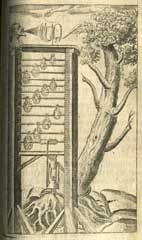 This is from John Wilkins's Mathematical Magick, published in 1648 (picture is from the 1707 edition), possibly the first book on applied mathematics in English. It shows a device by which a man, blowing into a straw (top left) can, by an arrangement of gears, uproot an oak tree. (Of course, this was before Newton's Laws of mechanics.)
This is from John Wilkins's Mathematical Magick, published in 1648 (picture is from the 1707 edition), possibly the first book on applied mathematics in English. It shows a device by which a man, blowing into a straw (top left) can, by an arrangement of gears, uproot an oak tree. (Of course, this was before Newton's Laws of mechanics.)As far as I know this machine was never made. Otherwise the Monty Python Lumberjack Song would have been rather different:
I'm a lumberjack and I'm OK,
I sleep by night and I work by day,
I blow down trees ...
Sunday, April 23, 2006
He wishes for...
Had I the heavens' embroidered cloths,
Enwrought with golden and silver light,
The blue and the dim and the dark cloths
Of night and light and he half-light,
I would spread the cloths under your feet:
But I, being poor, have only my dreams;
I have spread my dreams under your feet;
Tread softly because you tread on my dreams.
I have loved Skempton's music since I heard, by chance, Mary Wiegold singing his setting of Emily Dickinson's
How slow the Wind
How slow the sea -
How late their Feathers be.
(Not, as one website has it, "fathers"!)
The Yeats setting is on a CD by the Choir of Queens' College, Cambridge (alongside other settings by Skempton, Tippett, Judith Weir and Jonathan Harvey). (The title of the cover painting, by David Leverett, is Sensitive dependence on initial conditions, a problem I've often had to worry about in my mathematical career.)

I have been particularly thinking tonight about Harvey's setting of an extract ("Though mastering me God) from Hopkins's The Wreck of the Deutschland. I have loved this poem since my teens, and like Harvey's setting, which does not at all conform ot my expectations of how the poem might sound.
Why is it that, although an atheist, I find religious poetry and music speaks to me so powerfully? Do I lack the courage of my convictions?
Rain and Kippenberger
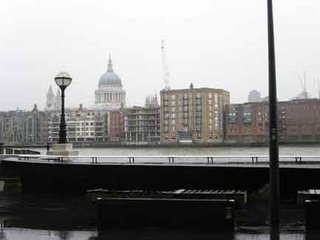 A wet and grey day in London. See Martin Kippenberger show at Tate Modern. An artist I feel very much in sympathy with. Very much an artist who fitted or set the mood of his time - the eighties and nineties. I remember the obituary in the Independent when he died a few years ago - profound, tragic and hilarious, at least in my memory. In this show I particularly like the work in the last room, Heavy Burschi. An assistant made copies from pictures in catalogues of Kippenberger's previous exhibitions, and then K had the copies destroyed, but not before photographing them. The room shows the framed photographs together with a skip holding the remains of the destroyed pictures.
A wet and grey day in London. See Martin Kippenberger show at Tate Modern. An artist I feel very much in sympathy with. Very much an artist who fitted or set the mood of his time - the eighties and nineties. I remember the obituary in the Independent when he died a few years ago - profound, tragic and hilarious, at least in my memory. In this show I particularly like the work in the last room, Heavy Burschi. An assistant made copies from pictures in catalogues of Kippenberger's previous exhibitions, and then K had the copies destroyed, but not before photographing them. The room shows the framed photographs together with a skip holding the remains of the destroyed pictures."I'm in favour of good-mood worlds. Because I'm on the good-mood side, although that's not to say that tragic things aren't constantly happening to me." - Kippenberger
Tobias Rehberger on Kippenberger's teaching methods: "He would talk. And talk. It was great and entertaining, but it was also horrible, repetitive and boring." Perhaps there is hope for my teaching yet.
Saturday, April 22, 2006
A Scots one
O luely, luely, cam she in
And luely she lay down:
I kent her be her caller lips
And her breists sae sma' and roun'.
A' thru the nicht we spak nae word
Nor sinder'd bane frae bane:
A' thru the nicht I heard her hert
Gang soundin' wi' my ain.
It was about the waukrife hour
When cocks begin to craw
That she smool'd saftly thru the mirk
Afore the day wud daw.
Sae luely, luely, cam she in
Sae luely was she gaen;
And wi' her a' my simmer days
Like they had never been.
So softly, softly came she in
And softly lay she down.
I knew her by her cool fresh lips
And her breasts so small and round.
All through the night we spoke no word
Nor parted bone from bone:
All through the night I heard her heart
Go sounding with my own.
It was about the waking hour
When cocks begin to crow
That she slipped softly through the gloom
Before the day would dawn.
So softly, softly, came she in
So softly was she gone;
And with her all my summer days
Like they had never been.
For a sunny spring morning
Is hung with bloom along the bough,
And stands about the woodland ride
Wearing white for Eastertide.
Now, of my threescore years and ten,
Twenty will not come again,
And take from seventy springs a score,
It only leaves me fifty more.
And since to look at things in bloom
Fifty springs are little room,
About the woodlands I will go
To see the cherry hung with snow.
Friday, April 21, 2006
English morality
Now playing - magnifiCathy
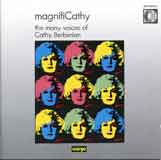 The wonderful Cathy Berberian with her hilarious Baroque version of "Ticket to ride":-
The wonderful Cathy Berberian with her hilarious Baroque version of "Ticket to ride":-I think I'm going to be sad, I think it's today -ay -ay -ay -ya
The man that's driving me mad is going away - ay -ay -ay- ay- ay -ay -ay -ay -ay -ay -ay.
He's got a ticket to ride,
He's got a ticket to ri - hi - ide,
He's got a ticket to ride, but he don't care...
And before that it was Cage's "The Wonderful Widow of Eighteen Springs" - "night - a silent-setting night... Isabel, sister Isabel, sainted Isabel, Madam Isabel..." .
I got this CD many years ago and it opened new worlds to me. And these two tracks (in particular) are even more wonderful now than when I first heard them.
Wednesday, April 19, 2006
Now playing
I have been doomed
from the first time I tried
to find something to save me
from all of my lies.
I'm always fake
and it's always the same
over and over and over again.
Foul mood

In a foul mood all day. Sorry, everyone. Brought on by marking, and reflecting on a year of rather unsuccessful teaching. Unable to think of any music I like that I'm prepared to listen to in this mood, so I've put on some tosh from the beginning of the twentieth century which is sufficiently annoying to be suitable. (And that comment's not fair on composer W.)
Hopefully, will be more civilised later.
Tuesday, April 18, 2006
Reviv'd, thanks to H
 My plants were suffering, constrained and starved. My guest has repotted them, so:
My plants were suffering, constrained and starved. My guest has repotted them, so:"and heating it with the Sun beams calt through a Burning-glass, it again reviv'd, Seeming, as it were, to have been all the intermediate time, but dead drunk, and after certain hours to grow fresh again and sober."
Set me as a seal upon thine heart
1) Dinu Lipatti playing his arrangement of Bach's "Jesu, joy of man's desiring" (second choice: Myra Hess's version)
2) Part, "Spiegel im spiegel"
3) Something by Mompou - almost any piece of his piano music
4) Purcell, "My beloved spake" (having heard Hadley's setting in Christ Church two days ago, I couldn't help comparing it to Purcell's. Not a fair comparison. Purcell's setting of "For lo, the winter is past, the rain is over and gone" is so ravishing that it makes any other setting of these words virtually inconceivable.
5) Howard Skempton's "Well, well, Cornelius" (wonderfully recorded by John Tilbury)
I guess my final choice would be the Lipatti and Skempton. Though perhaps the Skempton would be inappropiate for my funeral as it's a memorial pice for someone else (the composer Cornelius Cardew).
Anyway, as I'm thinking of it, here's Purcell's text from the Song of Songs:
My beloved spake, and said unto me, Rise up, my love, my fair one, and come away.
For, lo, the winer is past, the rain is over and gone;
The flowers appear on the earth; the time of the singing of birds is come, and the voice of the turtle is heard in our land;
The fig tree putteth forth her green figs, and the vines with the tender grape give a good smell. Arise, my love, my fair one, and come away.
My beloved is mine, and I am his.
(Song of Solomon, 2:10-13,16)
And thinking of the Purcell there comes to mind Messiaen's repeated setting in Psalmodie de l'ubiquite par amour (the third of his Trois petites liturgies de la presence divine), of the words
Set me as a seal upon thine heart.
Monday, April 17, 2006
Alma Mater (I) - Video meliora, proboque: deteriora sequor
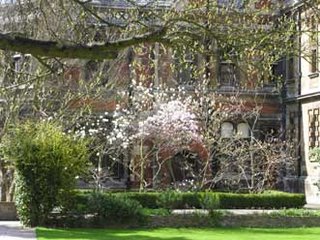
Back at my alma mater, I think about my former self. Naive, gauche, insensitive, inconsiderate. (And I still am, with less excuse now.)
But I do not like this stranger, this younger me. Would he like me? With his idealism, he would despise my compromises and accommodations, my cynicism, my smugness.
How lucky we don't know each other.
"(Oh, Mr Best,) where did it all go wrong?"
Sunday, April 16, 2006
Now playing ...
Memories: (B) Rather Sad
From the street a strain on my ear doth fall,
A tune as threadbare as that 'old red shawl',
It is tattered, it is torn,
It shows signs of being worn,
It's the tune my Uncle hummed from early morn,
'Twas a common little thing and kind 'a sweet,
But 'twas sad and seemed to slow up both his feet;
I can see him shuffling down
To the barn or to the town,
A humming.
But instead I put on a disc of Mexican orchestral music (starting with Moncayo's Huapongo) and my mood is quite different from sad nostalgic Ives.
"Contented river" - London by night
(Thanks, H)
Afternoon- Courtauld. Delighted as always by three luminous Bonnards. Astonished again by Kies van Dongen. My usual ambivalence towards Pechstein's powerful Bathers. Realising I barely know Vlaminck. Dufy is cheerful as always, and wonderful Macke goes straight to my soul.
Evening: The Royal Hunt of the Sun. Memories of schooldays (it was the school play in my first year at secondary school) and my English teacher, who I feared and who must have found me naive and wholly unimaginative: but uncomprehending though I was at the time, he is one who has made me who I am.
A good play: the hero, desperate for belief, inevitably disappointed. A personal calamity amongst a nation's ruin. Painful resonance with today's world. Will Bush and Blair be similarly treated by playwrights three centuries hence? Am I too hard on them?
Night: walking down the river seeing St Paul's behind the fake blue jacarandas. London, grey, wet and misty by day, now calm and relaxed. Peaceful Thames.
